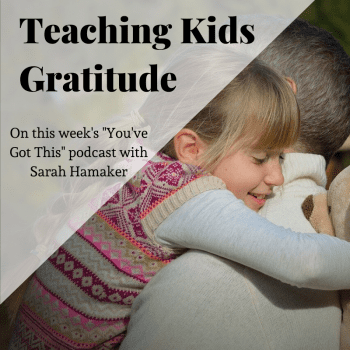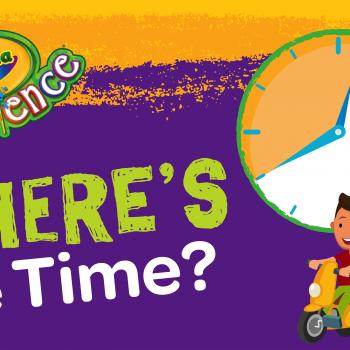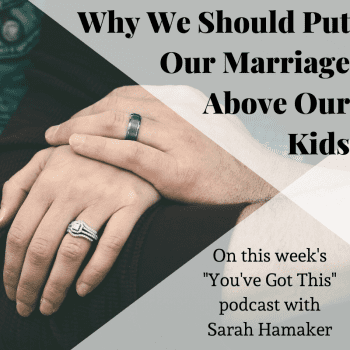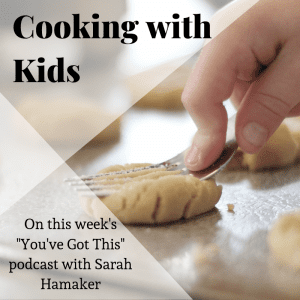
The following is an excerpt from my interview with Aurora Satler on my podcast, “You’ve Got This.”
Aurora is the author of The Ultimate New Mom’s Cookbook. For five years, Aurora worked as the creative director of Many Kitchens, an e-commerce site devoted to promoting the best small-batch artisanal food throughout the nation. Previously, Aurora owned her own New York City catering company and wrote for Chile Pepper Magazine. She lives in NYC with her two small children, and continues to work as an author, food stylist, photographer and on-camera chef.
It’s been kind of a passion of mine to teach them life skills through chores. One of the things that I think that can be very intimidating to parents is cooking. Many of us are very particular about the cleanliness of our kitchen, cross-contamination, and letting kids play with sharp objects like knives and a hot stove. How do we get over that and let our children into the kitchen?
Aurora: In a society we live in where there’s so many shows about cooking and everyone can go out to a restaurant, sometimes food can seem too heightened. But everybody has to eat. The funny thing is, sometimes, my kids don’t like my most impressive meals. There are so many different cultures of food, so many different recipes, and there really is something for any skill level and any amount of time that you can accomplish in the kitchen.
I think we do need to deconstruct the mystery in the kitchen, right? Not everything I cooked is Instagram-worthy.
Aurora: Just cooking alone will make your food a little healthier because you are doing less processed food, less packaged food. In the simple act of cooking, you’re already accomplishing something.
In general, how do we kind of demystify the cooking for the kids? How do we get them kind of interested in cooking, no matter what their age is?
Aurora: I have a 19-month-old and a four-year-old, and they are already in the kitchen. I mean, we just took actually cooking class as part of a friend’s birthday and I was pleasantly surprised with how involved they were. Some of the two most important factors that got them involved were the fact that things were brought down to their level by engaging with the ingredients. Another super important factor was giving them tools that they could use, like age-appropriate ergonomic plastic chef knives that were serrated, so it wasn’t just a toy—it was something that actually could accomplish a task. I think the problem is sometimes we give kids tools that we think are safe but are a dumbed-down version that doesn’t accomplish the same skill set.
When you are cooking, what you are doing is teaching different techniques with different recipes. Every little skill you are teaching adds to their cooking vocabulary and to the next recipe.
I want to teach them more than just skills because cooking is more than just techniques. It’s also learning how to balance a meal.
Aurora: Also balancing a dish, like how you get the right flavor out of it, teaching them just to taste as they go and find what they like. I think it’s exciting to discover new taste, new flavors. Sometimes, my kids will run across something they don’t know in a grocery store and they are still drawn with the curiosity of what is this? It’s easy to get stuck in a rut of making the same dishes because you know they are acceptable and will get consumed. By starting early, just think about how many more dishes you can add and more skills.
We also help our kids see where their vegetables come from by being part of a community supported agriculture program at a farm where we get veggies and fruit delivered to our door in season. When we go to the farm and have our kids pick their own produce, they are more likely to eat those potatoes. I think we forget we need to make those connections with them.
Aurora: That is 100% correct. We live in an apartment in New York City, and we have a small garden. You can have an herb garden in a window sill. It takes very little space, very little effort and you do not have to have a green thumb, but you are 100% correct that you’re going to have a child that is more engaged in that ingredient and much more willing to eat it because they will have a sense of pride that they grew it.
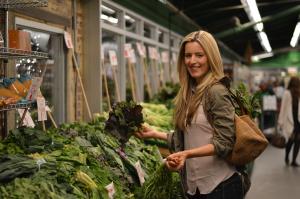 When we talk about preparing your kids for the future, and what kitchen tools do you think they should have when they go off on their own?
When we talk about preparing your kids for the future, and what kitchen tools do you think they should have when they go off on their own?
Aurora: What I really believe is that you don’t send your kids off with a dumbed-down version of any. Send them with a couple good things for their kitchen and they will already be well-prepared. Some of my things are a chef’s knife and a Dutch oven, which is absolutely one of my favorite cooking pots because you can do everything in it. A good cutting board, a paring knife, a great frying pan, and the little ones, like an all-vegetable peeler, a micro-plane, a good spatula, a whisk, and wooden spoons.
To hear more great advice and stories from Aruroa, listen to “Cooking With Kids” on the “You’ve Got This” podcast.



